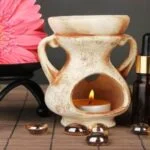Are you interested in becoming a certified aromatherapist? If so, you may be wondering, “How do you get certified in aromatherapy?” Aromatherapy certification is an essential step for individuals looking to pursue a career in this field. This article will provide an in-depth look at the process of obtaining certification, including its importance, the basic concepts of aromatherapy, finding the right program, requirements, the certification process itself, cost considerations, and continuing education opportunities.
Aromatherapy is the practice of using natural plant extracts to promote health and well-being. Aromatherapists utilize essential oils and other aromatic compounds to enhance both physical and emotional health. Obtaining certification in this field ensures that practitioners have a solid understanding of the principles and practices of aromatherapy, as well as the necessary skills to provide safe and effective treatments.
In this article, we will explore the different aspects of aromatherapy certification – from understanding its importance to finding the right program and meeting the necessary requirements for certification. Whether you are just starting your journey into aromatherapy or are considering expanding your knowledge and skills in this area, this comprehensive guide will provide you with valuable insights into the process of becoming a certified aromatherapist.
The Importance of Aromatherapy Certification
There are many benefits to becoming certified in aromatherapy, and obtaining a certification in this field can open up numerous opportunities for those interested in pursuing a career or business in the practice of aromatherapy. Aromatherapy certification serves as a testament to an individual’s knowledge, skills, and competence in using essential oils and other aromatic substances for therapeutic purposes.
One of the most significant reasons why obtaining a certification in aromatherapy is important is because it provides credibility and legitimacy to practitioners. Aromatherapy certification demonstrates that an individual has completed required training, education, and assessment to ensure their competency in practicing aromatherapy safely and effectively. This can be especially crucial for individuals seeking employment or looking to start their own practice as it provides assurance to potential clients or employers regarding their expertise.
Moreover, becoming certified in aromatherapy allows practitioners to stay updated with the latest developments and best practices in the field. Certification programs often include opportunities for professional development, continuing education, and access to research-based resources that can enhance one’s understanding of aromatherapy techniques and applications. By staying informed about new trends and advancements, certified aromatherapists can continue to provide high-quality services while furthering their knowledge and skills.
In addition, holding a certification in aromatherapy may also lead to increased professional opportunities such as teaching, consulting, or working within healthcare settings. Many institutions prefer or require practitioners to have a recognized certification before hiring them as educators or consultants. Furthermore, some healthcare facilities may only allow certified professionals to administer aromatherapy treatments to patients due to legal regulations and insurance requirements.
Understanding the Basics of Aromatherapy
Aromatherapy is a holistic healing treatment that uses natural plant extracts to promote health and well-being. These plant extracts, also known as essential oils, have been used for centuries for their therapeutic properties. Aromatherapy can be used to improve physical, emotional, and mental health, and is often used in conjunction with other alternative or conventional medical treatments.
To become certified in aromatherapy, it is important to understand the basics of this practice. This includes learning about the different essential oils and their individual properties, as well as understanding the various methods of application such as inhalation, topical application, and using them in massage oils or bath products. Additionally, it is crucial to have a solid understanding of the safety precautions and contraindications associated with using essential oils.
Those interested in pursuing certification in aromatherapy can choose from a variety of training programs that offer courses specifically tailored to this field. These programs provide in-depth knowledge on the history and principles of aromatherapy, as well as hands-on experience working with essential oils. Many certification programs also include education on anatomy and physiology, ethics and safety in aromatherapy practice, and business skills for those wishing to start their own aromatherapy practice.
| Aspect | Details |
|---|---|
| Essential Oils | Understanding individual properties of different essential oils |
| Application Methods | Inhalation, topical application, and use in massage oils or bath products |
| Training Programs | Diverse programs offering history of aromatherapy & hands-on experience with essential oils. |
Finding the Right Aromatherapy Certification Program
When it comes to finding the right aromatherapy certification program, there are a few factors to consider to ensure that you are enrolling in a reputable and comprehensive program.
Researching Accredited Programs
One of the most important steps in finding the right aromatherapy certification program is researching accredited programs. Look for programs that are recognized by reputable organizations such as the National Association for Holistic Aromatherapy (NAHA) or the Alliance of International Aromatherapists (AIA). These organizations have strict standards for aromatherapy education and certification, so choosing a program that is endorsed by them can give you confidence in the quality of education you will receive.
Program Curriculum and Approach
It’s also essential to consider the curriculum and approach of the certification program. Look for programs that cover a broad range of topics including essential oil safety, blending techniques, anatomy and physiology, aromatic chemistry, and ethical considerations in aromatherapy practice. Additionally, consider whether the program offers hands-on training and practical experience, as this is crucial for developing your skills as an aromatherapist.
Student Reviews and Testimonials
Before enrolling in an aromatherapy certification program, take the time to read student reviews and testimonials. This can provide valuable insight into the experiences of past students and give you an idea of what to expect from the program. Look for feedback on the quality of instruction, support from instructors, and overall satisfaction with the education received.
Ultimately, finding the right aromatherapy certification program requires thorough research and careful consideration of factors such as accreditation, curriculum, and student feedback. By choosing a reputable and comprehensive program, you can be confident in your education and training as you work towards becoming a certified aromatherapist.
The Requirements for Aromatherapy Certification
To become certified in aromatherapy, there are certain requirements that need to be met. These requirements vary depending on the certification program and the country in which you are seeking certification. Below, we will discuss some common requirements for obtaining a certification in aromatherapy.
Educational Requirements
One of the most important requirements for becoming certified in aromatherapy is completing a formal education in the field. This can include completing a training program or course that covers topics such as essential oil safety, therapeutic properties of essential oils, blending techniques, anatomy and physiology, and ethics. Many certification programs require a certain number of hours of study and practical experience before allowing students to sit for an exam.
Examination
In addition to completing an educational program, candidates for aromatherapy certification must also pass an examination. This exam typically tests their knowledge of essential oils, their uses, contraindications, blending methods, and other related topics. The exam may be written or practical in nature, or a combination of both.
Professional Experience
Some certification programs also require candidates to have a certain amount of professional experience working with essential oils and providing aromatherapy treatments. This may involve working under the supervision of a certified aromatherapist or gaining experience through internships or volunteer work.
Overall, the specific requirements for becoming certified in aromatherapy will depend on the program you choose to pursue. It is important to research different certification options and determine which one best fits your educational background and career goals.
The Process of Getting Certified in Aromatherapy
Aromatherapy Certification is a process that involves the study and practice of using essential oils and aromatic compounds for holistic health and wellness. Those who want to pursue a career in aromatherapy or simply deepen their knowledge and skills in this field often seek certification to validate their expertise. So, how do you get certified in aromatherapy?
The process of getting certified in aromatherapy typically involves completing a formal education program, gaining practical experience, and passing a certification exam. Below are the general steps involved in obtaining an aromatherapy certification:
1. Research Aromatherapy Certification Programs: The first step is to research and find a reputable aromatherapy certification program that aligns with your career goals and interests. Look for programs that are recognized by professional organizations such as the National Association for Holistic Aromatherapy (NAHA) or the Alliance of International Aromatherapists (AIA).
2. Enroll in an Aromatherapy Certification Course: Once you have found a suitable program, enroll in an accredited aromatherapy certification course. These courses may be offered online or in-person, and they typically cover topics such as essential oil safety, blending techniques, botanical studies, anatomy and physiology, and the therapeutic uses of essential oils.
3. Complete Practical Requirements: Depending on the certification program, you may need to complete practical requirements such as case studies, hands-on workshops, or supervised clinical hours to gain practical experience working with essential oils.
4. Take the Certification Exam: After completing the education and practical requirements, you will need to take a certification exam to demonstrate your knowledge and skills in aromatherapy. Passing the exam will qualify you for official certification as an aromatherapist.
By following these steps, individuals can obtain a formal certification in aromatherapy and establish themselves as knowledgeable professionals in the field.
The Cost of Aromatherapy Certification
The cost of obtaining certification in aromatherapy can vary depending on several factors. It is important to consider the fees associated with the certification program, as well as any additional costs such as study materials, exams, and membership dues to professional organizations. Here are some key factors to consider when evaluating the cost of aromatherapy certification:
- Certification Program Fees: Different schools and organizations offer aromatherapy certification programs at varying costs. Some programs may include tuition fees that cover all aspects of the certification process, while others may charge for individual courses or workshops.
- Study Materials: In addition to program fees, students pursuing aromatherapy certification may need to invest in textbooks, essential oils, diffusers, and other supplies for their studies. These materials can add to the overall cost of the certification process.
- Exam Fees: Many certification programs require students to pass an exam in order to become certified. There may be additional fees associated with registering for and taking these exams.
- Professional Memberships: Upon obtaining their aromatherapy certification, practitioners may choose to join professional organizations such as the Alliance of International Aromatherapists or the National Association for Holistic Aromatherapy. Membership dues for these organizations should also be factored into the overall cost of becoming certified.
It is essential for individuals interested in pursuing a career in aromatherapy to carefully research and compare the costs associated with different certification programs before making a decision. Additionally, students should inquire about any potential financial aid or scholarship opportunities that may be available to help offset the cost of certification. By understanding and budgeting for these expenses, aspiring aromatherapists can better prepare themselves for the investment required to obtain their certification.
Maintaining Aromatherapy Certification and Continuing Education Opportunities
After successfully completing an aromatherapy certification program, it is important to maintain your certification by participating in continuing education opportunities. These opportunities allow you to stay updated on the latest developments in aromatherapy, expand your knowledge and skills, and ensure that you are providing the best possible care to your clients or patients. Continuing education also demonstrates your commitment to professional growth and development within the field of aromatherapy.
There are various ways to fulfill the continuing education requirements for maintaining your aromatherapy certification. Many organizations offer workshops, seminars, webinars, and conferences specifically designed for certified aromatherapists. These events cover a wide range of topics such as advanced essential oil blending techniques, specialized applications of aromatherapy for different health conditions, and current research findings in the field.
In addition to attending organized events, you can also pursue self-study options to fulfill continuing education requirements. This may include reading books and peer-reviewed articles on aromatherapy, taking online courses from reputable institutions, or conducting independent research projects related to aromatherapy practice. It is important to verify that any self-study activities meet the criteria set forth by the certifying organization to ensure that they count towards maintaining your certification.
Conclusion
In conclusion, becoming certified in aromatherapy can open up a world of opportunities for those passionate about holistic healing and alternative medicine. The benefits of obtaining aromatherapy certification go beyond just the knowledge and skills gained; it also provides a professional validation that can enhance credibility and trust with clients and employers. Aromatherapy certification demonstrates a commitment to excellence and ongoing learning in the field, which is essential in an industry that continues to grow and evolve.
For those wondering how to get certified in aromatherapy, it is important to begin by understanding the basics of aromatherapy and finding the right certification program that meets your needs and goals. Look for programs that are accredited, comprehensive, and taught by experienced professionals in the field.
Additionally, consider the requirements for certification, including coursework, exams, and practical experience. While there may be a cost associated with obtaining certification, the investment in education and professional development can lead to increased opportunities for career advancement and personal fulfillment.
Once certified, it is important to stay current with advancements in aromatherapy through continuing education opportunities and maintaining certification as required. This will ensure that you are providing safe, effective, and ethical care to your clients while staying competitive in the industry. Ultimately, getting certified in aromatherapy not only benefits individuals pursuing a career in holistic health but also contributes to the overall quality and standards of practice within the field.
Frequently Asked Questions
What Does It Take to Be a Certified Aromatherapist?
Becoming a certified aromatherapist typically requires completing a comprehensive aromatherapy course from a reputable institution. These courses cover essential oils, their properties, and how to safely and effectively use them. Additionally, most certification programs include hands-on training and practical experience.
What Qualifications Do You Need to Be an Aromatherapist?
To become an aromatherapist, one needs to have a strong understanding of essential oils and their therapeutic uses. Many certification programs require a high school diploma or equivalent, as well as completion of an approved aromatherapy course. Some programs may also have specific prerequisites or recommendations for related education or experience in holistic health.
Is an Aromatherapy Certification Worth It?
Whether an aromatherapy certification is worth it depends on individual career goals and interests. For those passionate about holistic health and natural remedies, becoming certified can provide credibility and knowledge in the field.
It can also open up opportunities to work in spas, wellness centers, or even start your own business offering aromatherapy services. However, it’s important to carefully consider the investment of time and resources required for certification before pursuing it.

Are you looking for a natural way to improve your health and wellbeing?
If so, aromatherapy may be the answer for you.





